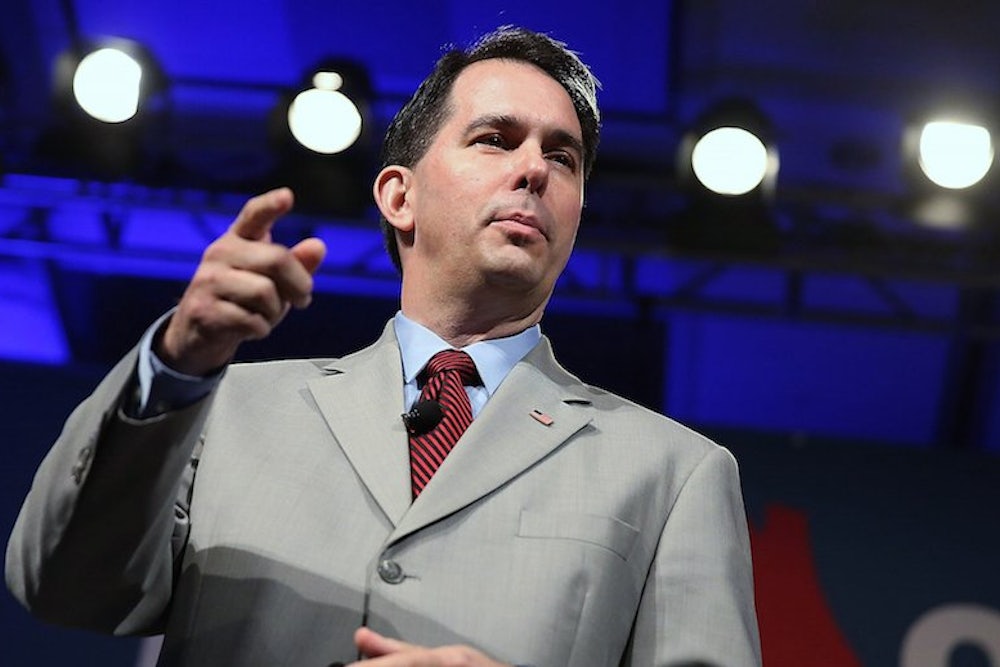The 14 Republicans running for president already meet the party’s every need for an anti-environment, climate change-denying nominee. There’s Texas Senator Ted Cruz, who would like to repeal Environmental Protection Agency regulations on climate change, in part because he thinks “there has been no recorded warming” in the last 15 years. Rick Perry, too, would like to see the EPA’s authority gutted and returned to the states. Rick Santorum admits that over the past 15 or 20 years there’s “clearly” been warming, but he contends that greenhouse gas emissions have had nothing to do with it.
But Wisconsin Governor Scott Walker, who is set to announce his own presidential candidacy on Monday, can claim a unique role as the GOP’s most dangerous candidate when it comes to the environment.
Just take a look at Walker's record in Wisconsin. As Mother Jones's Tim McDonnell has highlighted, Walker has proposed millions of dollars in cuts to environmental oversight and clean energy. His pick to lead the state's Department of Natural Resources is a fierce critic of environmental regulations. Under Walker, the department has postponed phosphorus pollution standards and weakened oversight of the manufacturing of "frac sand," which is used in hydraulic fracturing to prop open fissures in shale formations and gain access to natural gas. The number of environmental infractions issued by the department fell 28 percent under Walker, compared to the previous administration, a telling statistic on Walker’s priorities.
With a national election ahead, Walker is looking to fight environmental progress in a more public way: by taking a leading role in Republican efforts to block President Barack Obama’s plans for climate change. Senate Majority Leader Mitch McConnell has asked governors to refuse to comply with the EPA’s Clean Power Plan, which calls for state plans to restrict carbon pollution from power plants. So far, only a few governors have followed McConnell’s request. Two of them happen to be candidates for president: Bobby Jindal of Louisiana and Walker. In Wisconsin, the Clean Power Plan means reducing the state's reliance on coal for 62 percent of electricity by 30 percent in the next 15 years. Though the state is already halfway to meeting this target, Walker insisted to Obama that the “staggering costs" the regulations would have on the economy makes it “difficult to envision how Wisconsin can responsibly construct a state plan.” Walker also supported an early failed bid to block the regulations before they are finalized, joining 14 other states in suing the administration.
Walker isn’t just dangerous because of his poor record. He’s dangerous because of his willingness to embrace an anti-environmental platform as a central part of his campaign. His resistance to the Clean Power Plan shows that he means to draw attention to his conservative environmental positions, when many other candidates have tried to dodge the issue. Rand Paul, for instance, has highlighted areas in which he supports pollution cleanup, and even Perry has touted his own record on helping Texas clean up its air. And unlike conservatives like Cruz, Walker is a leading candidate in the race, with a more realistic shot at winning the GOP nomination, polling in second.
That may be one reason why conservative environmentalists, like Republican donor Jay Faison, are throwing their support behind Walker's chief adversary, Jeb Bush. Bush isn’t exactly comfortable talking about climate change. He's endorsed fracking as a way to cut the country's greenhouse gasses and has hinted at support for an international deal, yet he's offered little more than that. Otherwise, he supports the familiar GOP energy plank—the Keystone XL pipeline, coal, and oil drilling—and he's courted coal executives for donations. But as Florida governor, he also spent hundreds of millions of taxpayer dollars to restore the Florida Everglades and is one of the few GOP candidates to hint that climate change might be something to prepare for. Moderate conservatives hold out hope that Bush can take a reasonable environmental position in a general election.
At the moment, Bush is the clear GOP frontrunner, having already raised more than $100 million in his campaign's first months. But Walker could soon overtake him. He won't be receiving any donations from environmental supporters, but that shouldn't matter to him. With this record, he's poised to get the backing of two powerful polluters: Charles and David Koch.
